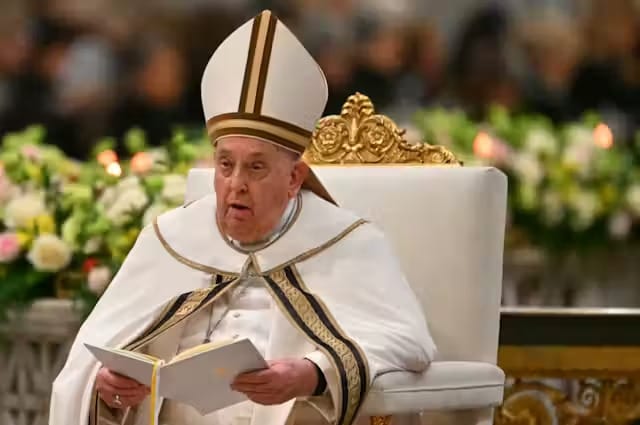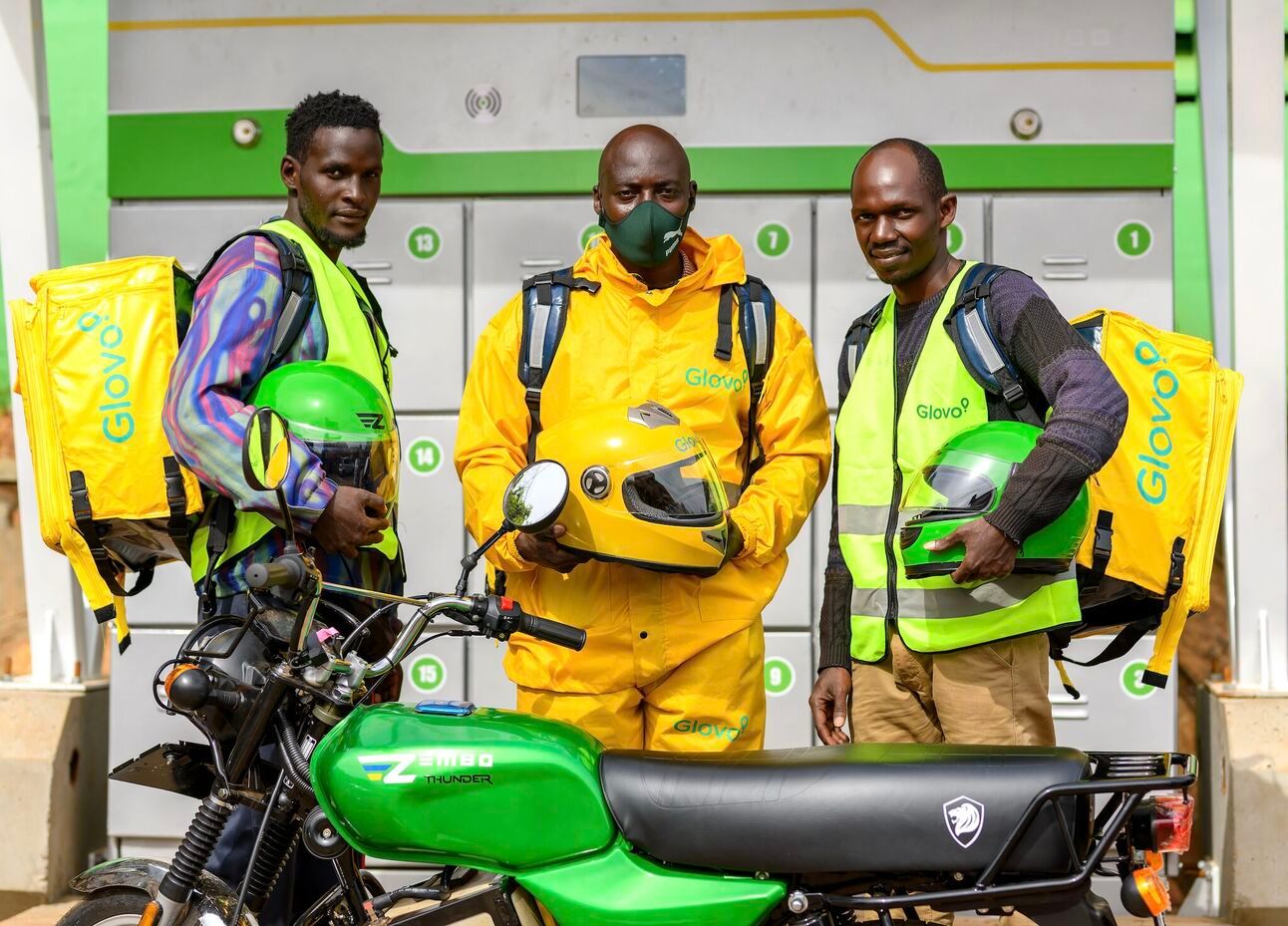- ClimateOS Africa.
- Posts
- #Issue 20. TLDR: How Pope Francis Made Climate Change a Spiritual Battle.
#Issue 20. TLDR: How Pope Francis Made Climate Change a Spiritual Battle.
Vatican mourns the late pontiff, whose encyclicals reshaped global climate action—calling out wealthy nations for "irresponsible lifestyles."
ClimateOS Africa | Issue 20
”Your comprehensive guide to Africa's climate and mobility revolution – packed with data, insights, and actionable intelligence"
🔥 Today’s Hot Takes
1️⃣ Pope Francis’ Climate Legacy: Vatican mourns the late pontiff, whose encyclicals reshaped global climate action—calling out wealthy nations for "irresponsible lifestyles."
2️⃣ Climate & Gender Violence: New report warns—40M more women & girls face intimate partner violence yearly due to rising temps by 2090.
3️⃣ Uganda’s E-Mobility Win: Glovo-Zembo partnership converts 130+ petrol bikes to electric in Kampala—boosting rider incomes & cutting emissions.
4️⃣ Addis Goes Electric: Ethiopia deploys 100 new AI-powered electric buses—charging 1km/sec via Ethio Telecom’s ultra-fast stations.
5️⃣ Solar Surge: Nigeria’s off-grid solar capacity jumps 72%—but financing gaps leave 60M in the dark.
Dive deeper below. 👇
🧠 THE BIG STORY: How Pope Francis Made Climate Change a Spiritual Battle.

Pope Francis.
When Pope Francis stepped onto the global stage, he brought with him a revolutionary idea: that climate change was not just an environmental issue, but a profound moral crisis. His 2015 encyclical Laudato Si’ shook the world by framing ecological destruction as a sin against both the planet and the poor. "The earth, our home, is beginning to look more and more like an immense pile of filth," he wrote, directly challenging the unchecked consumerism of wealthy nations while giving voice to vulnerable communities bearing the brunt of climate disasters.
The impact was immediate. During the Paris Agreement negotiations later that year, multiple world leaders quoted Laudato Si’, and its influence was credited with helping secure commitments from historically Catholic nations. Behind the scenes, the Vatican used its diplomatic power to push for stronger emissions targets, while Catholic institutions worldwide began divesting from fossil fuels—a movement that has since pulled billions from oil and coal projects.
Yet for all its influence, Francis’ vision faced fierce resistance. U.S. conservative Catholics dismissed his teachings as "left-wing ideology," and some African bishops quietly worried the focus on ecology distracted from more "pressing" issues like poverty. But the Pope’s 2023 follow-up, Laudate Deum, doubled down: he singled out the U.S. and Europe for their "irresponsible lifestyles" and called climate denial "a suicidal stance." As tributes pour in after his passing, activists argue his greatest legacy was making the climate crisis impossible for the faithful to ignore—though the world still struggles to live up to his challenge.
The Hidden Epidemic: Climate Change’s Brutal Toll on African Women
New research reveals a disturbing link between rising temperatures and gender-based violence across Africa. A landmark report by the Spotlight Initiative projects that by 2090, an additional 40 million women and girls per year could face intimate partner violence due to climate impacts—a statistic that lays bare the human cost of inaction.
The mechanisms are as varied as they are devastating. In drought-stricken regions like the Horn of Africa, women forced to walk farther for water face increased risks of assault along isolated routes. Displacement camps, where families crowd into makeshift shelters after floods or cyclones, have become hotspots for sexual violence. Perhaps most insidiously, child marriages are spiking in climate-vulnerable communities, as desperate families trade daughters for dowries during crop failures. "A 1°C temperature rise correlates with a 5% increase in violence," explains Dr. Amina Yusuf, a Nairobi-based gender researcher. "This isn’t speculation—we’re already seeing it in health clinic records across the Sahel."
While the data is grim, solutions are emerging. Kenya has begun training disaster responders in gender-sensitive protection protocols, while Malawi integrates violence prevention into its climate adaptation plans. But activists stress that without dedicated funding—and a reckoning with the patriarchal systems climate change exacerbates—the crisis will only deepen.
Kampala’s Green Delivery Revolution

Zembo and Glovo Partnership.
In the bustling streets of Uganda’s capital, an unlikely group of climate pioneers is emerging: food delivery riders. Thanks to a partnership between Glovo and electric vehicle startup Zembo, over 130 petrol-powered motorbikes have been replaced with silent, emission-free alternatives—and the riders couldn’t be happier.
"I used to spend half my earnings on fuel and repairs," says Faridah Nalwoga, one of the first to adopt an e-bike. "Now I charge for less than 5,000 shillings ($1.30) a day and take home 30% more profit." The secret lies in Zembo’s battery-swap stations, which allow riders to exchange depleted packs for fresh ones in under two minutes—eliminating the downtime of conventional charging.
The environmental math is equally compelling: each converted bike reduces CO2 emissions by 2.5 tons annually. With plans to scale to 5,000 riders by 2026, the model offers a blueprint for cleaning up Africa’s cities while boosting livelihoods. "This proves green tech isn’t a luxury," says Zembo CEO Daniel Dreher. "It’s a tool for economic liberation."
Ethiopia’s Electric Ambitions Charge Ahead
Addis Ababa’s streets are undergoing a quiet revolution. The recent rollout of 100 new electric buses—part of Ethiopia’s push to modernize transit while cutting emissions—showcases cutting-edge African innovation. The buses’ secret weapon? AI-powered charging stations developed by Ethio Telecom that deliver a staggering 1 kilometer of range per second of charging.
"The system knows exactly how much energy each bus needs and optimizes charging in real time," explains project lead Tsedey Asrat. Riders pay via the TeleBirr mobile app, seamlessly integrating clean transport with Ethiopia’s booming digital economy. Early data is promising: the fleet has already prevented over 500,000 kg of CO2 emissions—equivalent to planting a small forest.
But challenges remain. Limited charging infrastructure outside the capital and reliance on imported batteries threaten to slow progress. Officials hint at upcoming policies to spur local battery production—a move that could make Ethiopia a hub for green mobility.
Nigeria’s Solar Boom Leaves Millions Behind
While Nigeria’s off-grid solar sector grows at a blistering 72% annually, a stark divide persists. In Lagos, startups like Rensource deploy sleek solar microgrids powering entire neighborhoods, yet 60 million Nigerians still lack reliable electricity—a paradox rooted in policy and economics.
"The issue isn’t technology—it’s affordability," says energy analyst Chinedu Eze. High import tariffs (up to 30% on solar components) keep systems out of reach for rural communities. Meanwhile, opaque regulations discourage investment in poorer states. Some states are taking action: Kaduna recently waived taxes for solar projects in underserved areas, a model advocates hope will spread.
For families like the Umars in Kano, solutions can’t come soon enough. "We see solar lights in ads, but they cost three months’ salary," says matriarch Aisha Umar. Until prices drop, her children will keep doing homework by kerosene lamp—a reminder that even in a solar boom, equity remains unfinished business.
The Way Forward
This issue lays bare climate change’s complex tapestry—from the moral clarity of Pope Francis to the gritty reality of women facing violence in a warming world. The connective thread? Justice must be the foundation of all solutions. Whether through Kampala’s e-bike riders or Addis’ smart buses, Africa is proving that green transitions can uplift people—but only if designed with their needs at the center.
As debates over climate reparations grow louder, one question lingers: Will the world finally match Africa’s urgency with meaningful action? The next generation is watching.
🔥 P.S. We want your voice: Should African nations take legal action against polluting countries? Share your perspective for our next issue.
— The ClimateOS Team
Want more? Dive into our special report on Africa’s top climate tech startups [here].